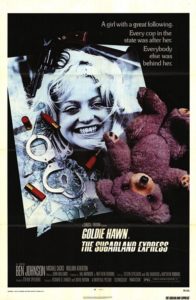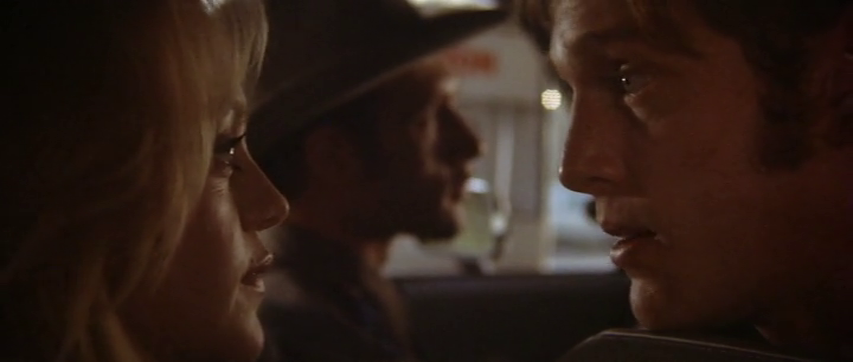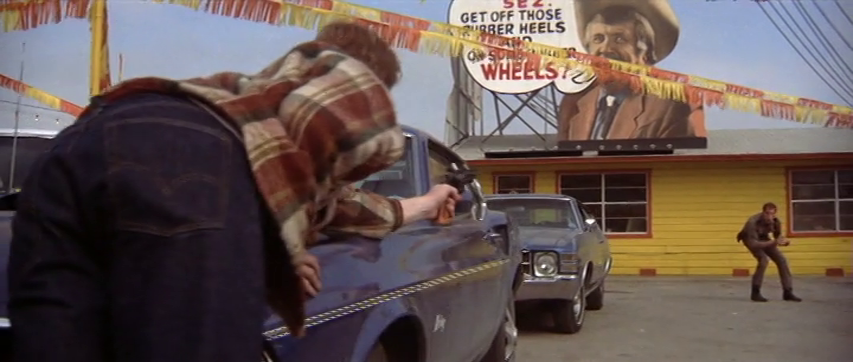|

Synopsis:
A mother (Goldie Hawn) recently released from prison convinces her about-to-be-released husband (William Atherton) to go on the lam and retrieve their young son from his foster parents. During their escape, they take a patrol officer (Michael Sachs) hostage, and soon develop an uneasy friendship — but will the captain (Ben Johnson) in charge of the situation give Hawn and Atherton a second chance?
|
|
Genres, Themes, Actors, and Directors:
- Car Chase
- Criminal Couples on the Run
- Goldie Hawn Films
- Hostages
- Media Spectacles
- Steven Spielberg Films
Response to Peary’s Review:
Peary writes that “Steven Spielberg’s debut film is exciting, offbeat entertainment” with “the kinetic energy and visual dynamism of Spielberg’s later films”, but “far more cynical”. He points out how “Spielberg sways us into favoring Lou Jean [Hawn] by showing us the too-old foster mother and a baby that cries anytime she holds it”, but notes he “wouldn’t want the baby to be given to Lou Jean — she is a sweet person, but she’s off her rocker”. He asserts that “people like Lou Jen and Clovis [Atheron] have no chance — they act impulsively and naively, never comprehending that they’re taking on a force that will crush them.” While “Tanner [Johnson] may feel sympathetic toward the couple… he will take only so much of their challenging the law”, and “the police will impersonally carry out their role in the drama — just as the government scientists will carry out their impersonal role in E.T.” He adds that “the shame is that there is no attempt to understand Lou Jean and Clovis on a personal level, so that the police could understand that Lou Jean and Clovis would never harm Slide” — but that’s not necessarily true; given Hawn’s determination to “rescue” her son and live a “normal” family life, there’s no telling what she wouldn’t do on behalf of this goal. Peary notes that while the “picture has interesting characters”, “Spielberg gives us no one who can be admired”. With that said, the “acting is solid”, the “action sequences are extremely well done”, and Vilmos Zsigmond’s cinematography is “impressive”.
Redeeming Qualities and Moments:
- Fine performances by the two leads

- Vilmos Zsigmond’s cinematography


Must See?
No, but it’s recommended as a well-directed chase flick with heart.
Links:
|




3 thoughts on “Sugarland Express, The (1974)”
Spielberg’s first film is a solid, enjoyable chase-road film but not must see; its only significance is that it was his first theatrical effort.
Not must-see.
I’d seen this once before, around the time of its initial release – and had just about completely forgotten it. (As I’ve said before, that’s not particularly a good sign.)
Seeing it again, it comes off as rather un-Spielberg-like and (refreshingly) free of the manipulative tricks he would later begin to employ in his films. The approach here is straightforward and the story is allowed to simply unfold and play out.
Still, it hasn’t got a lot of places to go as a narrative, it’s often repetitive; it’s engaging in the sense that you do wonder how it will all turn out.
Midway, there’s a lengthy, unexpected ambush sequence that is rather well-orchestrated.
Hawn stands out – though she doesn’t do much by way of subtext; she’s just true to the nature of this kind of under-educated, impulsive character.
Not must see unless one wants to see Spielberg’s first theatrical film. Frankly, the made for TV “Duel” is much better.
I really had a hard time with Goldie Hawn’s character, and that ruined the excitement. I didn’t mind male lead (William Atherton), or the two primary law enforcement characters played by Ben Johnson and Michael Sacks, but the general overall execution had me looking at when this will get over.
The 70’s and Spielberg – Jaws and Close Encounters are great, this is mediocre, and 1941 is terrible.